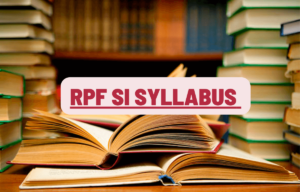Madhya Pradesh Public Service Commission (MPPSC) conducts the MP Food Safety Officer Exam to recruit eligible candidates for the Food Safety Officer posts and conducted at various exam centres across the state. Candidates should check all the subject‑wise topics in the MP FSO Syllabus 2026 during their preparation so that no topic is missed. They should also look at the exam pattern to understand which subjects or sections carry the most marks.
MP FSO Syllabus and Exam Pattern 2026
The MPPSC Food Safety Officer Exam has two sections, General Studies and Food Science & Technology, which cover many topics. Candidates should prepare for these subjects by following the MPPSC FSO Syllabus 2026. The selection process consists of a written exam and an interview. Interested and eligible candidates must use the latest syllabus and exam pattern to prepare well and get selected for the Food Safety Officer (FSO) post.
| MPPSC Food Safety Officer Syllabus & Exam Pattern 2026-Overview | |
| Organization | Madhya Pradesh Public Service Commission |
| Post | Food Safety Officer (FSO) |
| Category | Syllabus |
| Number of Questions | 150 |
| Total Marks | 450 |
| Duration | 3 hours |
| Selection Process | Written Exam Interview |
| Official Website | www.mppsc.mp.gov.in |
MPPSC FSO Result 2025-26 Out- Click to Check
MPPSC FSO Exam Pattern 2026
Candidates who will be appearing for the exam can go through the MPPSC Food Safety Officer Exam Pattern 2026. The exam will consist of 2 sections, i.e., Section A and Section B. Section A will contain 50 questions with 150 marks, and Section B will contain 100 questions with 300 marks. The exam will last 3 hours.
- Minimum Qualifying Marks
- For the General category: 40% marks in both Section A and Section B separately.
- For SC/ST/OBC/EWS/PH candidates: 30% marks in both sections separately.
- Marking Scheme
- Correct Answer: +3 marks
- Incorrect Answer: –1 mark
| MPPSC Food Safety Officer Exam Pattern 2026 | |||
| Sections | Number of Questions | Marks | Duration |
| Section A | 50 | 150 | 3 Hours |
| Section B | 100 | 300 | |
| Total | 150 | 450 | |
MP Food Safety Officer Syllabus 2026
Here, we have provided detailed information on the MPPSC Food Safety Officer Syllabus 2026. Candidates who will be appearing for the exam should go through the syllabus to prepare for the exam. The exam will be conducted in 2 Sections, and the syllabus, including units and topics, is tabulated below;
Section A: General Studies
Here is the detailed syllabus of section A, i.e., General Studies, which is tabled below;
| MP Food Safety Officer Syllabus for General Studies | |
| History of Madhya Pradesh |
|
| Geography of Madhya Pradesh |
|
| Economy of Madhya Pradesh |
|
| Politics of Madhya Pradesh |
|
| Tribes of Madhya Pradesh: Heritage, Folk Culture and Folk Literature (with special reference to MP) |
|
Section B: Food Science and Technology
Here is the detailed syllabus for section B i.e. Food Science and Technology, is tabled below;
| MP Food Safety Officer Syllabus for Science & Technology | |
| Topics | Subtopics |
| Introduction to Basic Food Science |
|
| Food Microbiology |
|
| Food and Nutrition |
|
| Food Preservation, Packaging, and Storage |
|
| Farming System |
|
| Food Safety, Hygiene, and Standards |
|
| Integrated Agriculture Production |
|
| Animal Product Processing |
|
| Food Processing Technology |
|
| Food Laws, Regulations, and Certification |
|
MP FSO Syllabus 2026 PDF
Madhya Pradesh Public Service Commission (MPPSC) has released the official MP FSO (Food Safety Officer) Syllabus PDF on its website, www.mppsc.mp.gov.in. Candidates can download the MPPSC FSO syllabus PDF from the mentioned link and take a printout, and plan and follow a proper study schedule for the exam.



 BPSC TRE 4.0 Syllabus 2026 and Exam Patt...
BPSC TRE 4.0 Syllabus 2026 and Exam Patt...
 SSC Selection Post Phase 14 Syllabus and...
SSC Selection Post Phase 14 Syllabus and...
 RPF SI Syllabus 2026 and Exam Pattern, S...
RPF SI Syllabus 2026 and Exam Pattern, S...







